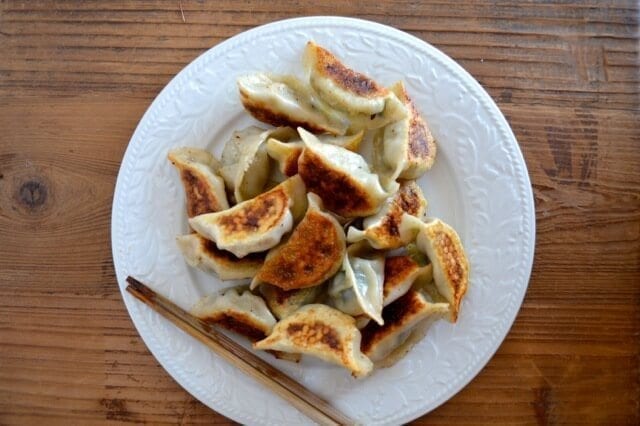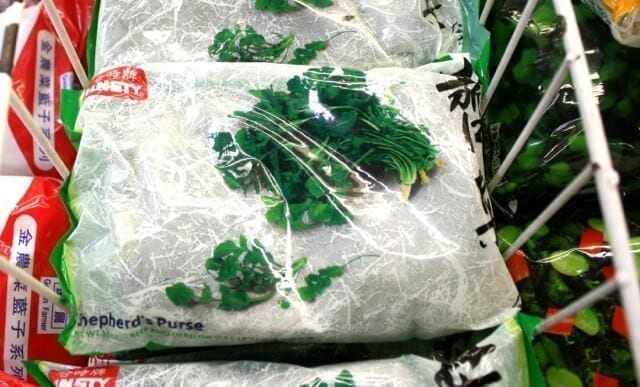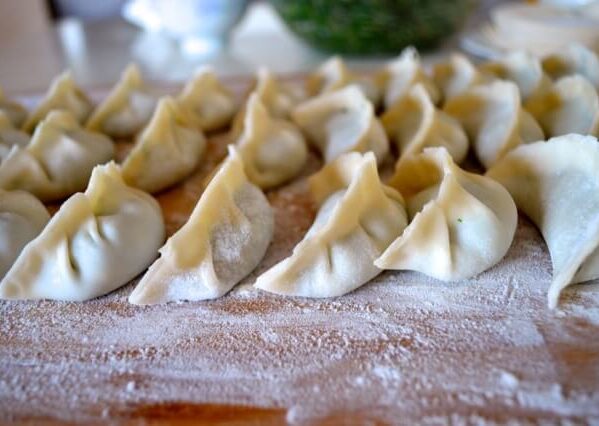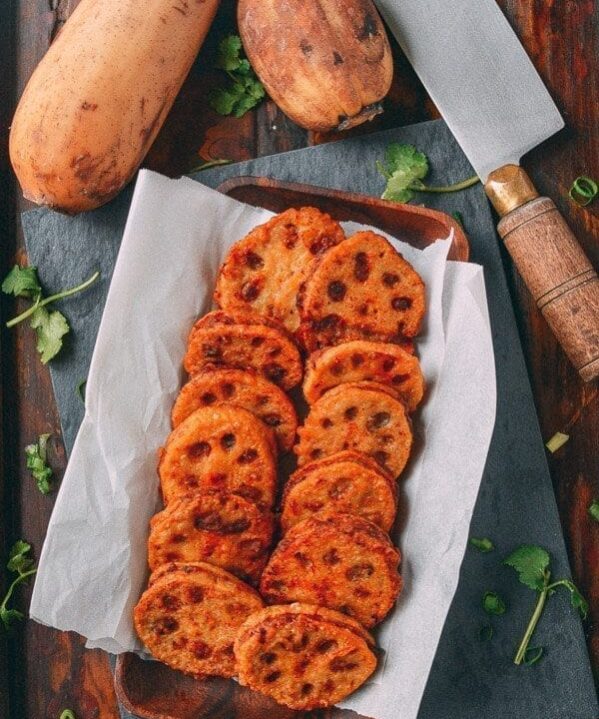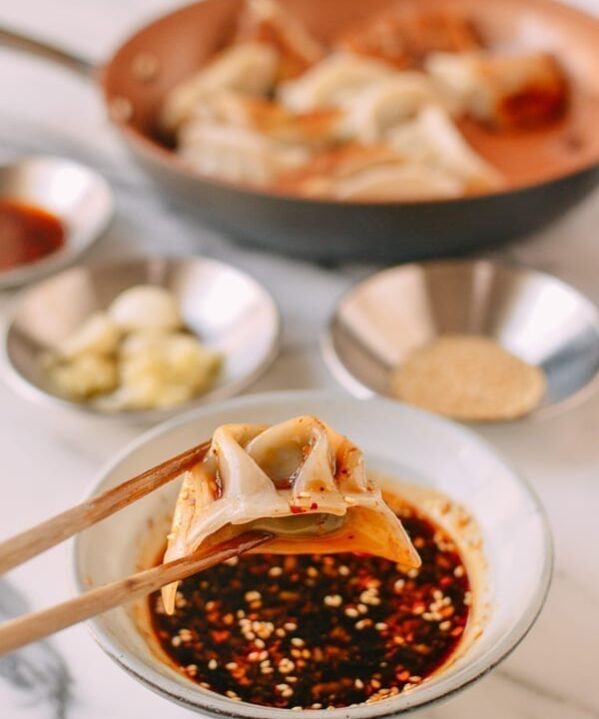Recently, we got a question from one of our lovely readers inquiring as to why there hadn’t been a recipe posted that matched the little photo in our Welcome message. And because we’re totally against false advertising (I’m talking to YOU, Siri)…we present: our family’s dumpling recipe.
That little overexposed photo in the sidebar there is actually a picture of some amazing dumplings, or jiaozi, that we got from a street stall in Shanghai. I’m of the opinion that the Shanghainese are the Botticelli’s—the Michelangelo’s, Velasquez’s, and Van Gogh’s—of dumpling making. No one does it quite like they do. Luckily, I have a very loud, dumpling-making Shanghainese side of the family.
We’ve been making this dumpling recipe for a long time. A LONG time. I remember sitting on a stool in my grandmother’s kitchen on 161st Street in Queens, learning to fold these…my seven-year-old fingers clumsily stumbling over everything…getting the wrappers way too wet, putting in too much filling, and crossing my fingers by the stove in a futile attempt to keep them from opening up while they cooked.
It was a time when my only cares in the world were how I was going turn my weekly $5 allowance into a new puppy, staying in Mrs. Alercio’s (Gregory Elementary school’s most feared second grade teacher) good books, and making sure I kept up with the latest episodes of Boy Meets World. Nowadays, my grandmother, my mom, my sister, and I get all Joy Luck Clubby about it and sit down at the kitchen table every so often to make an enormous batch for the freezer.
We’ve been making some variation of this same recipe for as long as I can remember, and I’ve been eating them and sharing them for just as long—a quick meal on a lazy weeknight, an appetizer at one of my parents’ dinner parties, a well-deserved after school snack, or a taste of home at college. One of Kaitlin’s high school friends can literally devour them by the plateful.
We’ve eaten a lot of dumplings in Beijing, but somehow, we always come back to these.
If maybe this isn’t the only dumpling recipe you think you need, also check out our recipes for pork & chive dumplings, easy pork cabbage potstickers, and Shanghai soup dumplings.
Can’t find store-bought dumpling wrappers?
Make your own with just flour and water, using our homemade dumpling wrapper recipe! This recipe makes enough filling for 7-8 dozen dumplings, while our wrapper recipe makes enough for 8-9 dozen. You may have extra wrappers leftover, but that’s ok. We have ideas in the post for what to do with leftover wrappers! (Hint: you can make shortcut scallion pancakes with them!)
Chinese Dumplings: Recipe Instructions
Okay, let’s talk veg. In particular, leafy green vegetables.
In the photos, you’ll see these little green leafies that look kind of like a cross between dandelion greens and arugula. It’s actually called jicai or “Shepherd’s Purse.”
In the US, you’ll only find shepherd’s purse in the frozen foods section of a well-stocked Chinese grocery store. If you can get it, then grab those babies out of the freezer section and never let go. It’s so much more convenient to use than the fresh stuff, which is all we get here in Beijing.
Last year, we bought some Shepherd’s purse seeds and managed to grow some in the garden. They looked a little bit like weeds but boy do they have great flavor for dumplings and wontons. If you’re a gardener, and like dumplings or wontons, then get yourself some seeds and start cultivating!
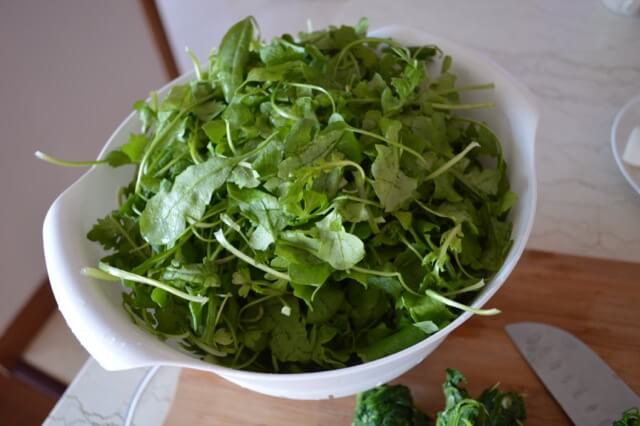
But…if you find yourself in a place where one could never hope to locate an obscure Chinese vegetable, we also encourage the use of vegetables that you don’t need to tear your hair out to find.
You can go with baby bok choy (the tender little green ones. Not the giant, stringy ones you find at Stop & Shop), napa cabbage, or Chinese chives. If using fresh, all of these vegetables need to go through a blanching process, with the exception of the Chinese chives (which can just be chopped finely and then thrown in with the meat).
So first things first. Wash your veg to get them really clean. No one likes a sandy dumpling. Blanch them for a minute and throw them in an ice bath.
If using frozen ji cai, just defrost the veg, rinse it well under cold water, and praise the Gods for making it easy on you. (Washing fresh ji cai is a slow, tedious, finger-numbing task that I’m sure they would have in Tartarus if the Greeks had ji cai).
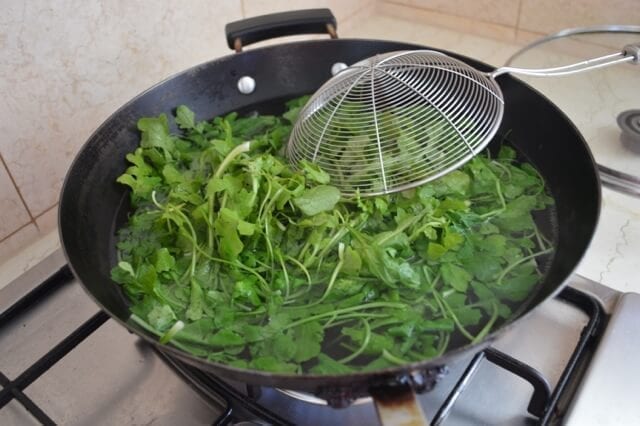
Then, ring out the veggies like you’re squeezing a washcloth. Get all the liquid you can out of them.
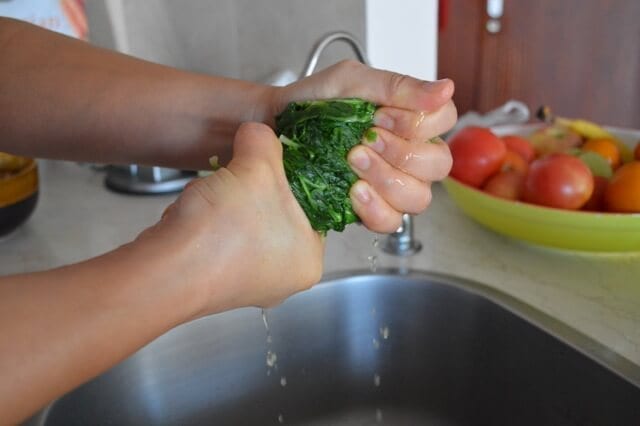
Get out the chopping block and chop the veggies VERY finely. As finely as you possibly can, or the filling will be overly stringy. Not the adjective we’re looking for in this instance.
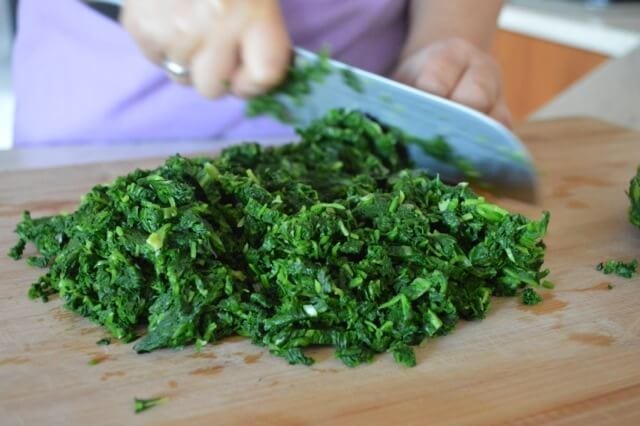
Throw it in with your meat. You can change the ratio of meat to vegetable in this dumpling recipe to however you like. We like a lot of veg with less meat, but you can replace some of the veg with more meat if you like. We suggest NOT going all vegetarian with these, though.
Vegetarian dumplings are tricky little things. One needs a whole new plan of attack (we have a separate vegetable dumpling recipe). Your meat should also be relatively fatty. Too lean, and the poor things will be dry and lifeless.
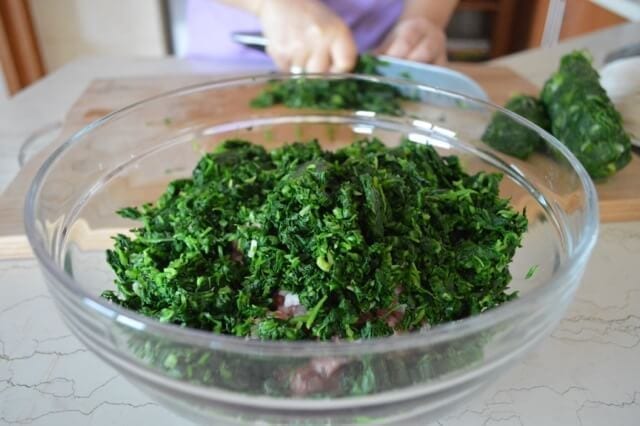
Add the Shaoxing wine, oil, sesame oil, salt, soy sauce, white pepper, and water.
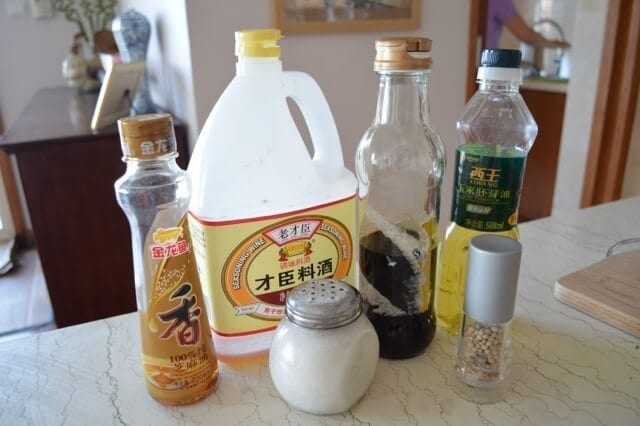
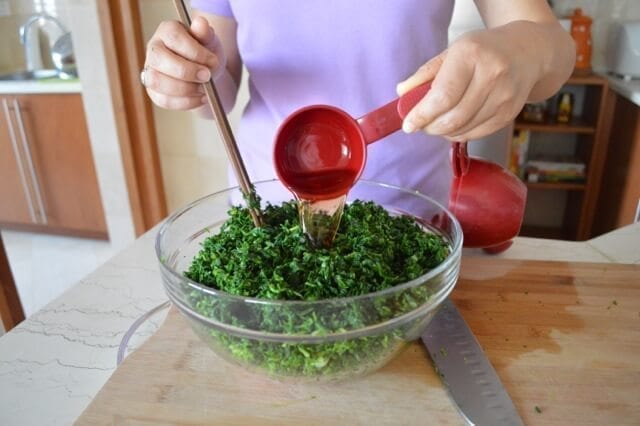
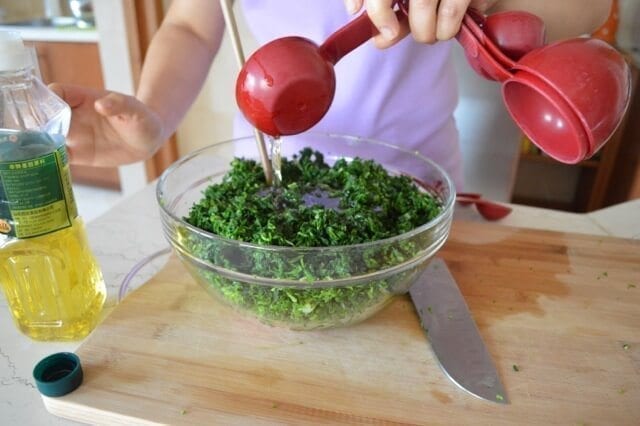
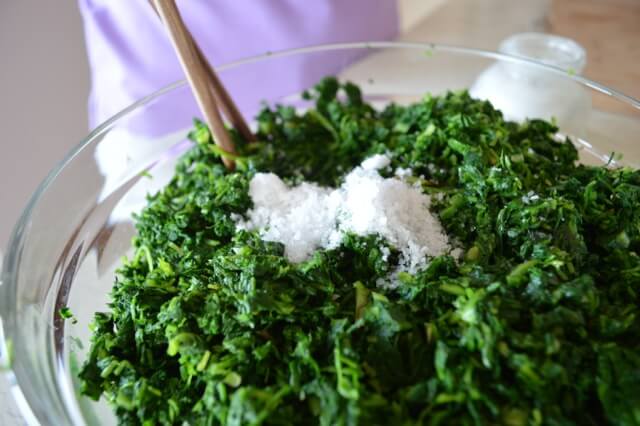
And…mix.
And mix.
And then mix some more.
What you’re doing here is creating a very soft, smooth texture for the filling. It’s really important to mix your filling until it almost looks like a paste. We find that grabbing two chopsticks in one’s fist, followed by 6-8 minutes of exuberant stirring yields the best filling consistency.
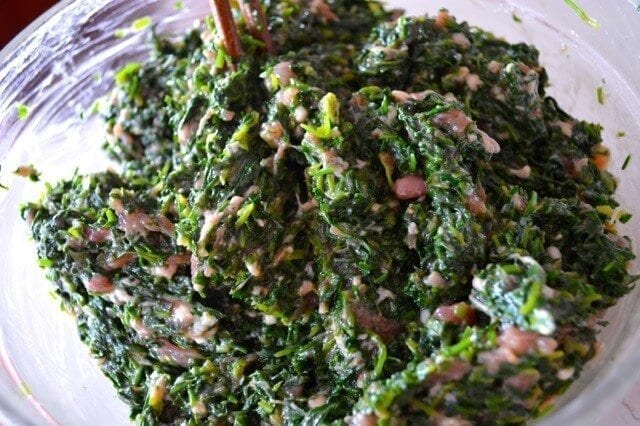
And now…the wrapping. Don’t be afraid! It’s not as hard as it looks. You, dear reader, are probably not a seven-year-old with clumsy hands, and you’ll probably figure it out faster than I did in my cartoon-watching days. (Okay, let’s be real. I still watch cartoons. I’m a major dork for anything having to do with airbending, 90s-era Nickelodeon, and Pixar. I have the emotional maturity of a twelve-year-old, apparently).
Ahem.
Anyway, you can buy dumpling skins at the Asian grocery store. You’re looking for the white round ones. If left out in the open air for too long, you may find that the edges start to dry out.
If that happens, wrap them in a damp paper towel and put them in a sealed plastic bag for a couple hours to soften back up. You can freeze any unused dumpling wrappers in an airtight sealed plastic bag for later.
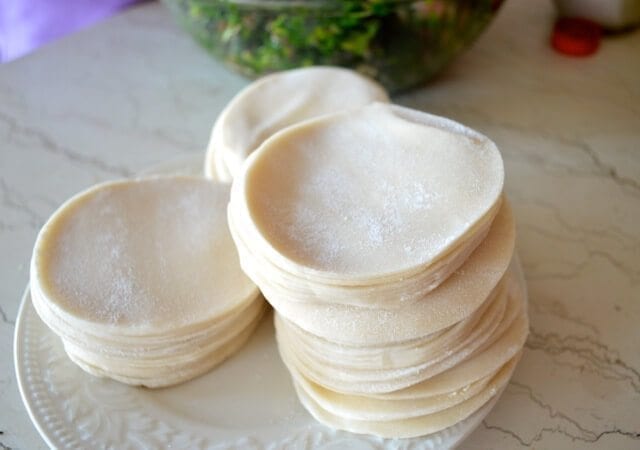
To the wrapping! Get yourself a little bowl of water and dampen the edges of each wrapper.
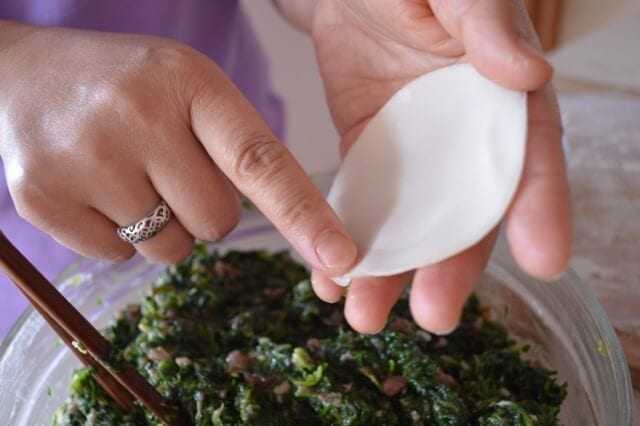
Then place a little less than a tablespoon of filling in the middle.
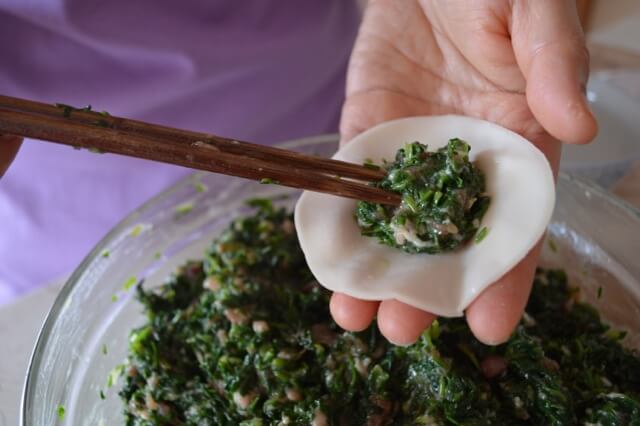
There are several ways to do this next wrapping step, but the easiest way for first timers is to pinch the wrapper in half at a point in the middle…
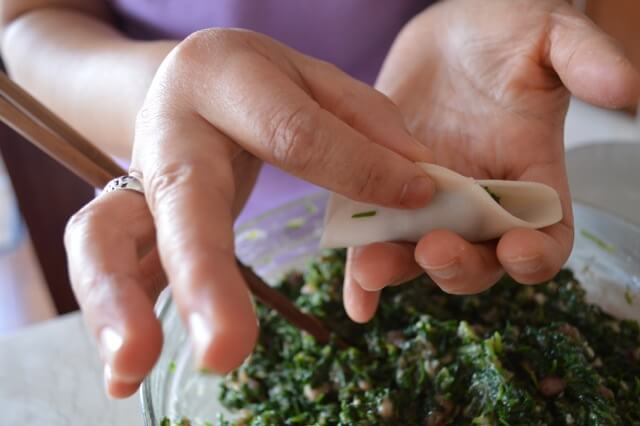
…and then fold the skins over twice on each side.
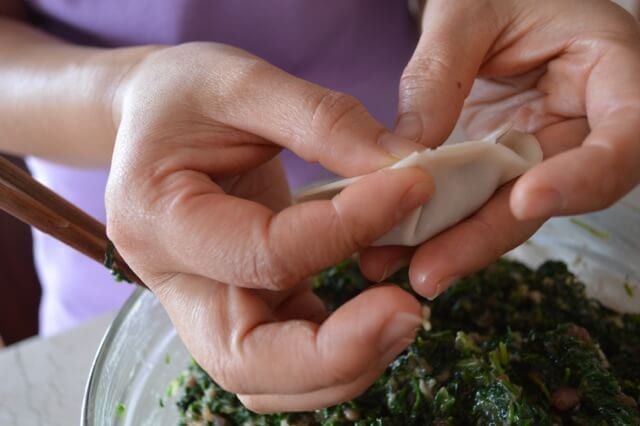
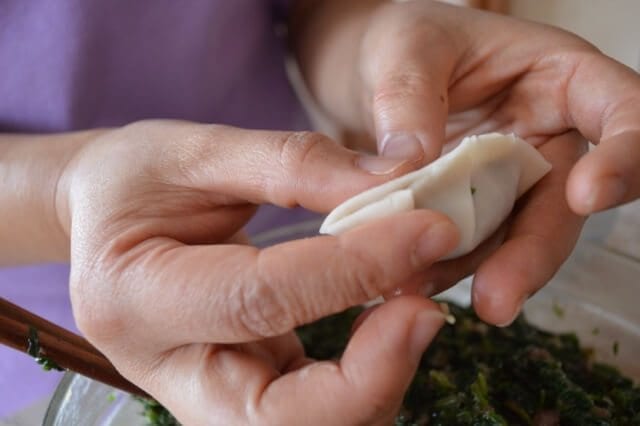
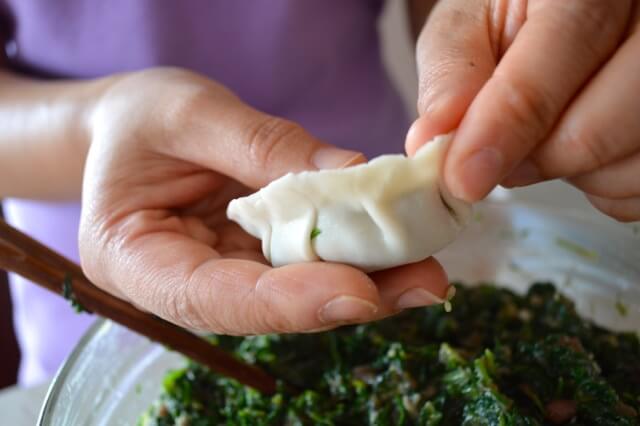
At the end, it will look kind of like a little fan.
An adorable, tasty fan.
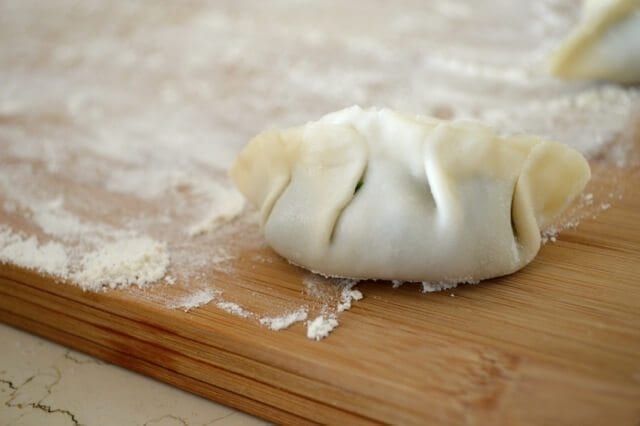
And that’s it! (For more pictures and detailed instructions, check out our full tutorial on how to fold dumplings, using 4 techniques from beginner to advanced.)
Boil a test dumpling and taste it for salt and flavor. Perhaps you added a little more meat than our dumpling recipe called for. Perhaps your salt isn’t as salty, or your soy sauce is a different brand than we use. It’s not an exact science, but the only way to figure out how to get the flavor right is to test and taste. Add a little of this or that…sesame oil, soy sauce, salt, pepper, wine, water…if you think it needs it. Once you’ve got the perfect filling, go through the dumpling folding steps.
Keep doing that…for the next 2 hours, or until all your filling is gone. Put on the TV, grab a dumpling buddy, and get to work. If you plan to eat them fresh, just place them on a floured surface to keep them from sticking. If you plan to freeze them for later, place them on a baking sheet lined with parchment paper, making sure that none of the dumplings are touching.
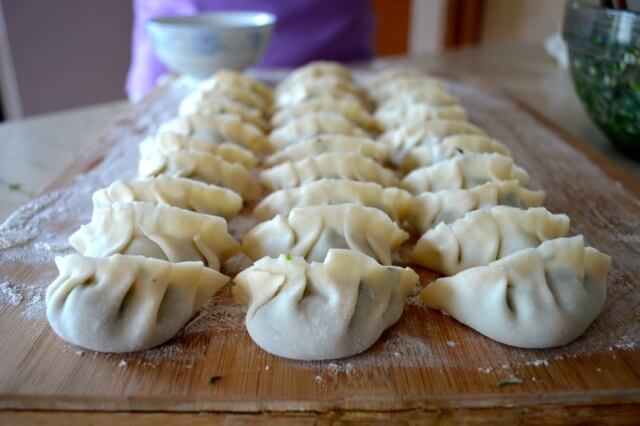
It’s an art in and of itself to try to adjust the filling amounts you put in as filling and wrapper supplies deplete–to try and use all of both. If we have more wrappers, I reduce the amount of filling I put in a bit. If we don’t have enough, then I make bigger dumplings. But if you end up with leftovers, don’t sweat it. You can wrap up extra dumpling wrappers for later, and make the filling into little meatballs and fry them up.
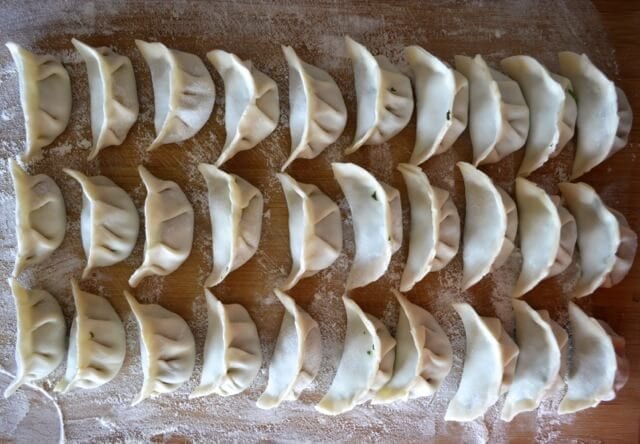
Aren’t they prettyyy?
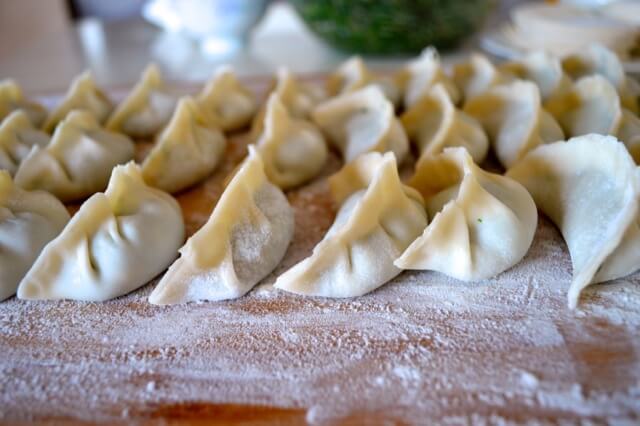
Time to taste the fruit of our labors!
Here’s how you cook them. You have a couple choices.
To boil: just bring a large pot of water to a boil and throw the dumplings in there. If using fresh, they’re usually done when they float to the top and start to look transparent. If using frozen, they may need a bit longer to cook through.
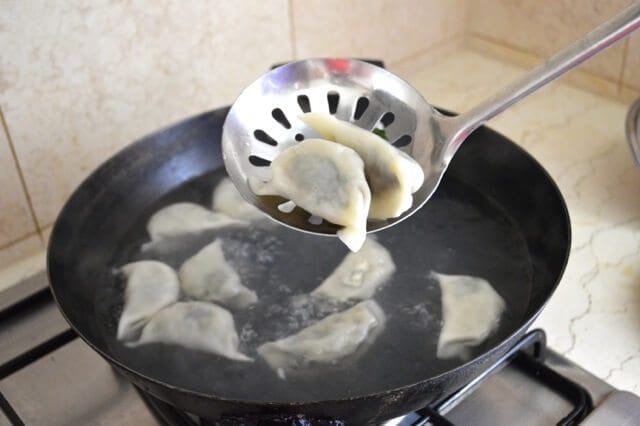
To pan-fry the dumplings:
Heat a non-stick pan or cast-iron skillet over medium high heat and add a couple tablespoons of oil. Add the dumplings in a circular formation around the pan and allow them to fry for a couple minutes.
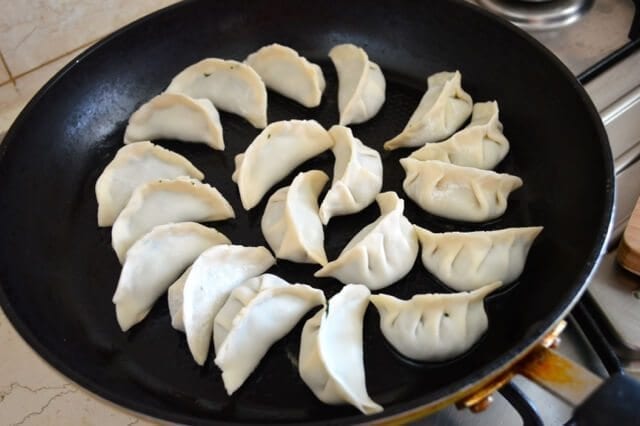
Then, pour a thin layer of water into the pan.
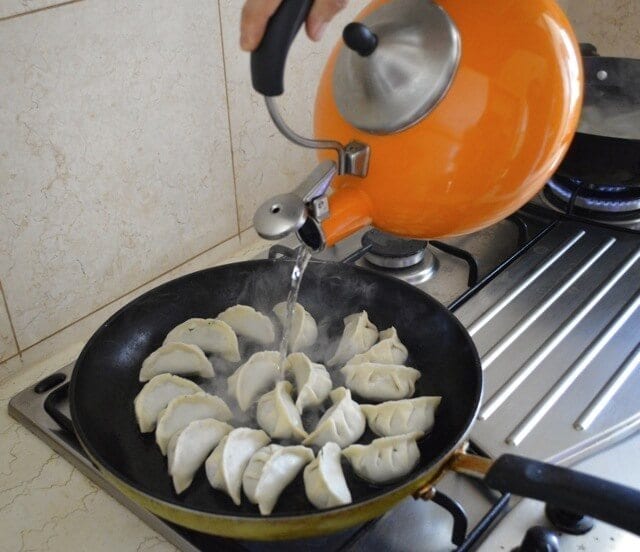
Cover and reduce the heat to medium-low. Steam until the water has evaporated.
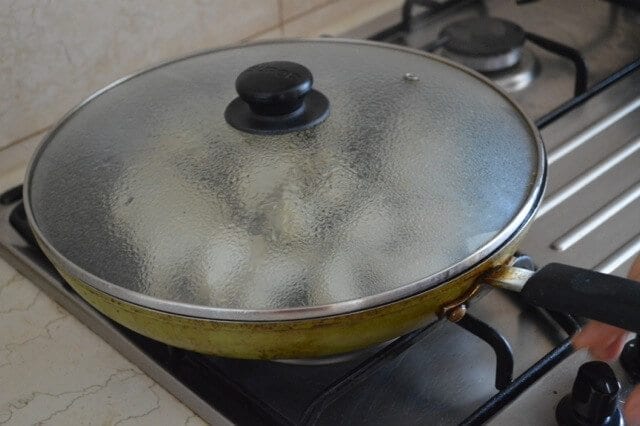
Check the dumplings. If they still look a little raw, put in some more water, cover the pan again, and steam them for a little longer.
Once all the water has evaporated and they look cooked through, raise the heat to medium high and allow them to cook uncovered until the bottoms are golden brown and crisp.
And finally…serve the little darlings! Here’s the boiled version:
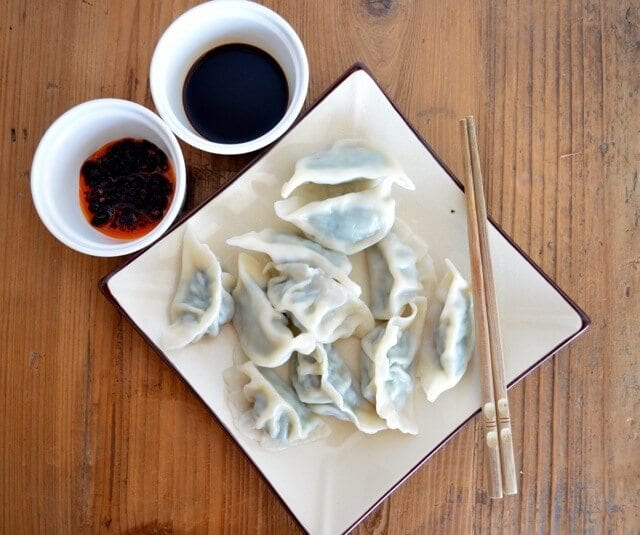
And the pan-fried version. These are little pockets of light, joy, and deliciousness.
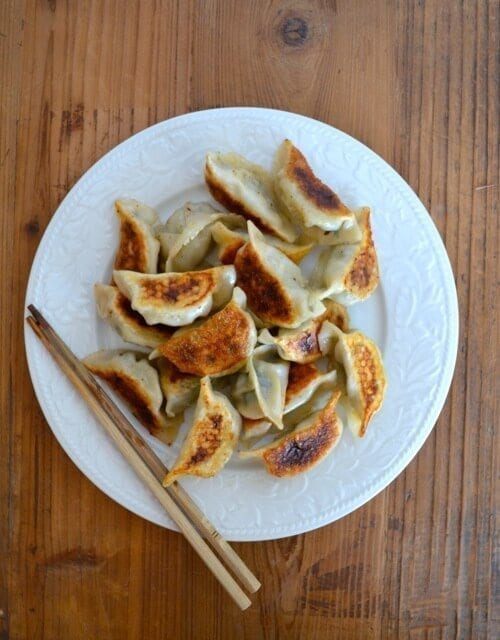
You can also steam these dumplings. Get a full tutorial on how to cook dumplings (steaming, boiling, or pan-frying).
P.S. We like to eat our pockets of light, joy, and deliciousness with chili sauce and Chinese black vinegar. For a full recipe and explanation on the perfect dipping sauce, see our traditional dumpling sauce recipe.
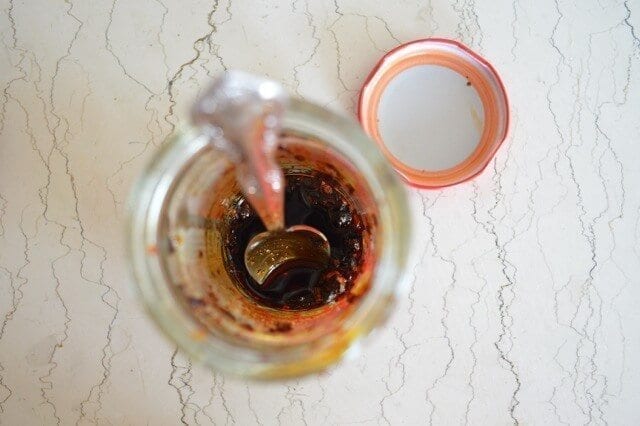
P.S.S: If you’d like to freeze them, wrap the baking sheets tightly with plastic wrap and put the pans in the freezer. Allow them to freeze overnight. You can then take the sheets out of the freezer, transfer the dumplings to Ziploc bags, and throw them back in the freezer for use later.
P.S.S.S. Phew. This was a long one. I feel I need this last P.S. to decompress. Generations of acquired knowledge in this dumpling recipe, all rolled into one tidy post, without skimping on detail. For those of you who don’t like reading as many words as I’ve written here, here’s a condensed, printable version of the recipe:
The ONLY Dumpling Recipe You’ll Ever Need
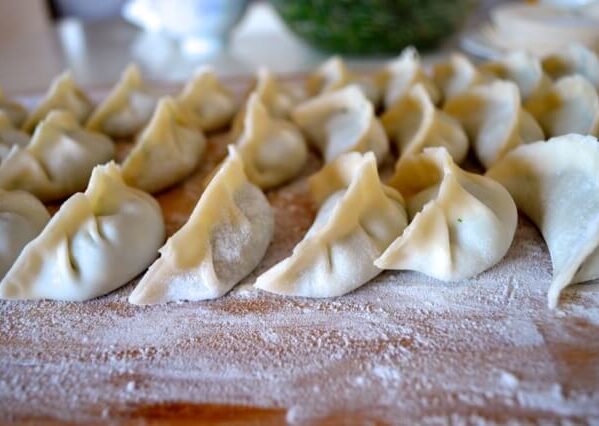
Ingredients
- 3 lbs green leafy vegetable (1.35kg, like shepherd’s purse, baby bok choy, napa cabbage, or Chinese chives)
- 1 ½ pounds ground pork (680g; can substitute ground chicken or beef, as long as they aren’t too lean)
- 2/3 cup shaoxing wine
- ½ cup oil
- 3 tablespoons sesame oil
- 1 tablespoon salt
- 3 tablespoons soy sauce
- ¼ teaspoon white pepper
- 2/3 cup water (plus more for assembly)
- 3 packages dumpling wrappers
Instructions
- Wash your vegetables thoroughly and blanch them in a pot of boiling water. Transfer them to an ice bath to cool. Ring out all the water from the vegetables and chop very finely.
- In a large bowl, stir together the vegetable, meat, wine, oil, sesame oil, salt, soy sauce, white pepper, and 2/3 cup water. Mix for 6-8 minutes, until very well-combined.
- To wrap the dumplings, dampen the edges of each circle with some water. Put a little less than a tablespoon of filling in the middle. Fold the circle in half and pinch the wrapper together at the top. Then make two folds on each side, until the dumpling looks like a fan. Make sure it’s completely sealed. Repeat until all the filling is gone, placing the dumplings on a baking sheet lined with parchment. Make sure the dumplings aren’t sticking together.
- If you’d like to freeze them, wrap the baking sheets tightly with plastic wrap and put the pans in the freezer. Allow them to freeze overnight. You can then take the sheets out of the freezer, transfer the dumplings to Ziploc bags, and throw them back in the freezer for use later.
- To cook the dumplings, boil them or pan-fry them. To boil, simple bring a large pot of water to a boil, drop the dumplings in, and cook until they float to the top and the skins are cooked through, but still slightly al dente.
- To pan-fry, heat 2 tablespoons oil in a non-stick pan over medium high heat. Place the dumplings in the pan and allow to fry for 2 minutes. Pour a thin layer of water into the pan, cover, and reduce heat to medium-low. Allow dumplings to steam until the water has evaporated. Remove the cover, increase heat to medium-high and allow to fry for a few more minutes, until the bottoms of the dumplings are golden brown and crisp.
- Serve with soy sauce, Chinese black vinegar, chili sauce, or other dipping sauce of your choice!
